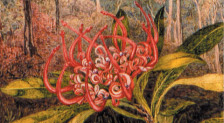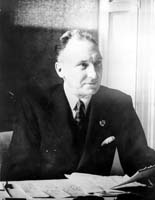 |
 |
|
Douglas (Social) Credit
The Douglas (Social) Credit movement was inspired by the Scottish engineer, CH Douglas. He sought to maximise wealth by ensuring that there be as much credit available as the communal economy could effectively absorb, and that egalitarian income distribution sustain consumer demand. Throughout Australia such ideas conformed with long-standing suspicion of 'the money power'. In Tasmania as elsewhere Douglasism had some support in the 1920s, much intensified in the Depression's aftermath. A pioneer activist, JM Modridge, also upheld theosophy, a frequent overlap. More distinctive of Tasmania was strong support from within the Labor Party. Future premiers Edward Brooker and Edmund Dwyer-Gray were exemplars. GS Carruthers, a 'Credit' candidate victorious in the House of Assembly elections in June 1934 and the only Douglasite to win an Australian parliamentary seat, had been an ALP member until just previously; through his term, lasting until 1937, Carruthers gave decisive if discriminating support to AG Ogilvie's government. However Douglasism always appealed more widely than to traditional Labor sympathisers. Its candidates won 15 percent of Tasmania's House of Representatives votes, in September 1934. In 1935 Carruthers chaired a Parliamentary committee that reported on 'the monetary system' in Douglasite spirit. 'Radicalism and mistrust express itself in Douglas Credit', wrote the perceptive adult educationist EM Higgins from Launceston in 1936. A Marxist, Higgins disparaged Douglasism, as notably did his Tasmanian fellow-spirit KM Dallas. From 1936–7 Douglasite support declined, although still in 1947 Robert Cosgrove's government asked Treasury economist KJ Binns to study Alberta's experience under 'Credit' government. 'Nothing to be learnt', reported Binns. Further reading: B Berzins, 'The Social Credit movement in Australia to 1940', MA thesis, University of New South Wales, 1967; R Davis, 'Social Credit …', THRAPP 25/4, 1978. Michael Roe |
Copyright 2006, Centre for Tasmanian Historical Studies |
